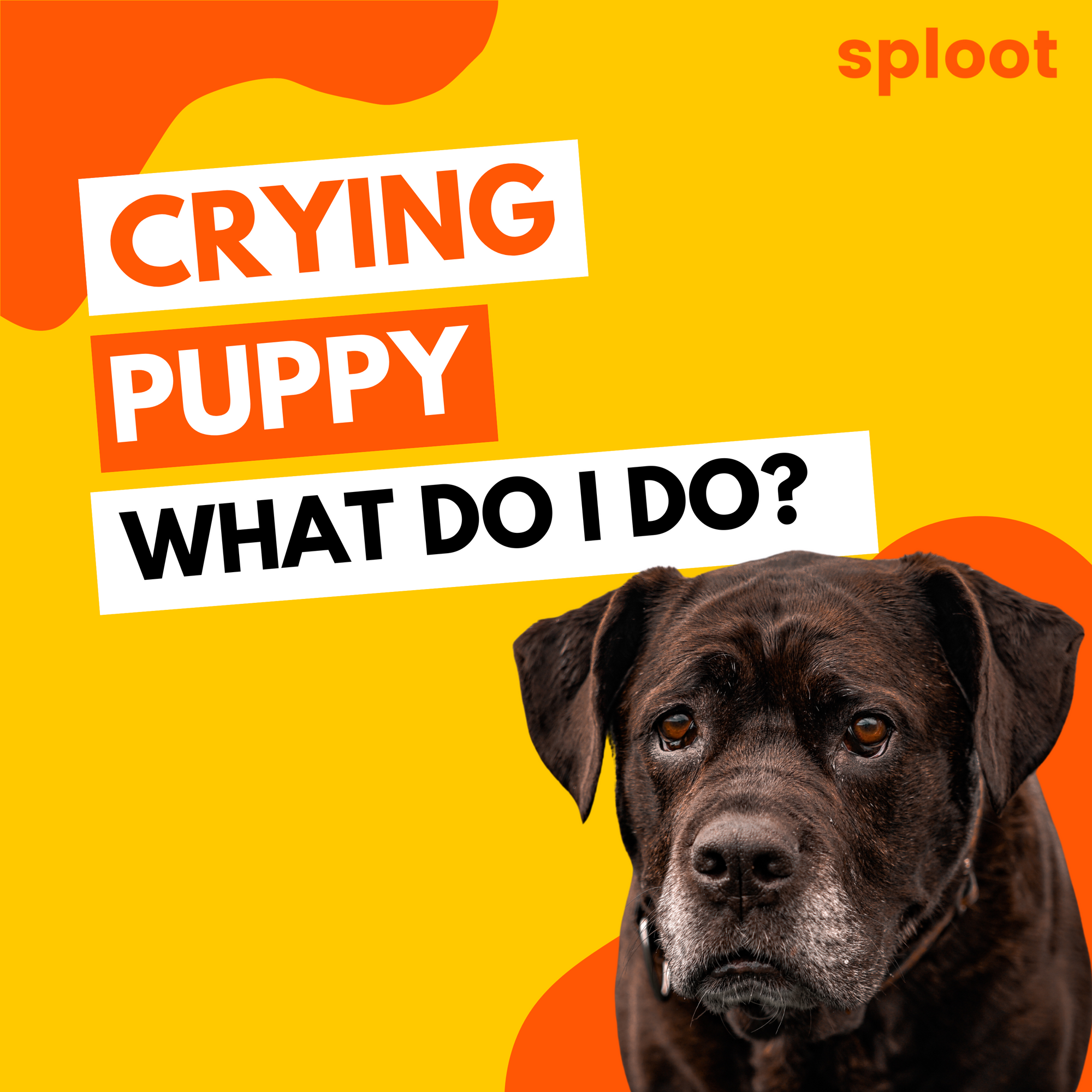Crying Puppy: Reasons & How To Help?

Welcoming home puppies is very much like bringing home new babies. There are a lot of similarities in both these cases. One such example is the way they communicate. Just like babies cry just about for any other reason, puppies do so too.
A crying puppy is a common phenomenon. It could mean a lot of things like they’re hungry, they’re hurt, or they’re just throwing a tantrum. In this article, we’ll explore everything related to crying puppies and how you can help them.
Why do puppies cry?
Puppies cry to communicate something that they might be feeling. This feeling can be a wide range of things and it may take you some time to figure it out perfectly every time.
There’s nothing to worry about as after the bond between you and your puppy gets stronger, puppy crying reduces and you understand each other better.
To help you out, here are 6 common reasons why puppies cry and how you may help them in the situation:
Puppy is feeling lonely
Puppies are social animals and may cry when they miss the company of their littermates or humans. You could help by spending some quality time with your puppy. Play, cuddle, and provide comfort. Consider getting another pet or arranging playdates for companionship.
Puppy is anxious
New environments, people, or experiences can make puppies anxious. They cry to express their unease. Gradually introduce your puppy to new situations and people. Use positive reinforcement to build their confidence. Create a safe and familiar space at home.
Puppy is hungry
Just like us, puppies get hungry! Crying is their way of saying, "Feed me!" Follow a regular feeding schedule and provide nutritious meals. Ensure fresh water is always available. Consult your vet for appropriate portion sizes.
Puppy feels sick
Illness or discomfort can cause crying. It's their way of letting you know something's wrong. If your puppy appears sick or in pain, consult your veterinarian immediately. Regular check-ups can catch issues early.
Your puppy’s first vet visit can be a little overwhelming. Here’s some help: Puppy’s First Vet Visit.
Puppy wants attention
Puppies love attention and might cry to get it, especially when they want to play or be near you. Balance attention and training. Teach your puppy to entertain themselves with toys, but also set aside time for play and affection.
Puppy is bored
Puppies have lots of energy and can get bored easily. They cry when they need mental and physical stimulation. Provide toys, puzzles, and interactive games. Daily walks and playtime help burn energy and keep them engaged.
When do puppies usually start to cry?
Puppies cry or whimper for the first time at around 3-4 weeks when they are away from their litter mates. It’s a way of communicating to the mother that the puppy needs help find its way back.
On a similar note, when puppies are brought home, they may cry frequently in the initial days. The new place might be frightening for them and they need some extra comfort during this time.
Puppies also cry when they experience new things like crate training. They’re not used to it and it may trigger some anxiety at first. With proper training and treats, they can get accustomed to it and may as well enjoy it.
How to stop puppies from crying?
To make a puppy stop crying, ensure that all its basic needs are met. Puppies cry to communicate, so try to understand if they’re trying to say something. Check with the above-mentioned reasons for them crying and try out different things.
If nothing works, have some patience. Give time to the puppy to adjust to the new surroundings. Meanwhile here are some ways you could avoid the crying situation:
Provide crate training
Introduce your puppy to a crate, making it a safe and cozy den. Puppies often find comfort in confined spaces, so use the crate for short periods and gradually increase the time. This helps them feel secure and reduces their need to cry.
Ensure that the puppy does not feel jailed inside the crate. It should be a positive reinforcement and should not make the puppy further anxious.
Comfort your puppy, without attention
When your puppy cries for attention, resist the urge to pick them up immediately. Instead, you could offer comfort by sitting nearby and speaking soothingly. You can gently stroke their fur or place a hand inside the crate if they're in one.
Responding immediately when they cry can set a negative understanding for them. Your puppy will think that crying gets them what they want. So it's essential to strike a balance between comforting and reinforcing the crying behavior.
Potty train your puppy
Puppies may cry when they need to go potty. Establish a regular bathroom routine, taking them outside after meals and naps. Praise and reward them when they go outside, reinforcing the idea that outside is the right place to potty.
Exercise regularly
Puppies have boundless energy. To prevent them from crying due to boredom or restlessness, engage them in playtime. Fetch, tug-of-war, or simple games like hide and seek can help burn off their energy.
Short, frequent walks tailored to their age and breed also contribute to a tired and content puppy. Work them out so that they feel content and get a full night’s sleep at home.
Follow a routine
Dogs thrive on predictability. Establishing a routine helps your puppy know what to expect, reducing anxiety and the urge to cry.
For example, feed them at the same times each day, take them out for potty breaks at consistent intervals, and ensure they have scheduled play and nap times. This predictability provides comfort and reassurance for your puppy avoiding it to cry.
Should I ignore my puppy crying?
No, you should not ignore your puppy crying. While it is important to teach a dog independence, leaving a puppy alone at a young stage can further increase their anxiety. This may damage your bond with your puppy. Draw a line between giving generous attention while crying and providing the necessary amount of comfort.
Providing the right amount of comfort means responding to your puppy's calm moments in between the crying. This reinforces good behavior. Giving too much attention while crying is when you respond immediately to their cries, reinforcing the crying itself.
Is puppy crying normal?
Yes, puppy crying is absolutely normal. Puppies often whine and cry as a way to communicate with their new owners. This vocalization is their primary means of expressing their needs. Sometimes, it's clear why they're crying, like when they're hungry and it's close to mealtime.
Just like babies get out of the crying habit as they grow up, puppies do so too. Adulthood comes in with understanding their surroundings better and their owners. Hence, there’s less room for anxiousness.
Some puppies or adult dogs may even whine when they’re excited. When this happens along with a tail wagging, it’s not a bad thing. It’s just that your puppy cannot control their excitement. It’s just another way of communication.
If you're interested in reading more such blogs, download the sploot app.

